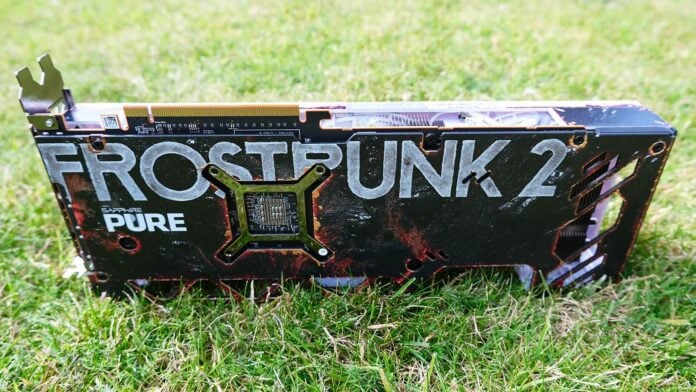AMD’s Radeon RX 7700 XT graphics card celebrated its first birthday on September 6 this year. Now a proven design for the midrange, Sapphire is upping the style with a special edition dedicated to just-released Frostpunk 2.
A history lesson first. Built using the latest Navi 32 architecture, the GPU is best thought of as a cutdown RX 7800 XT because both share the same die. There’s enough horsepower under the hood to drive latest games at an agreeable QHD resolution, naturally with all bells and whistles turned on. Not a bad bet for a card starting at around £375 and rivalling the GeForce RTX 4060 Ti from Nvidia.
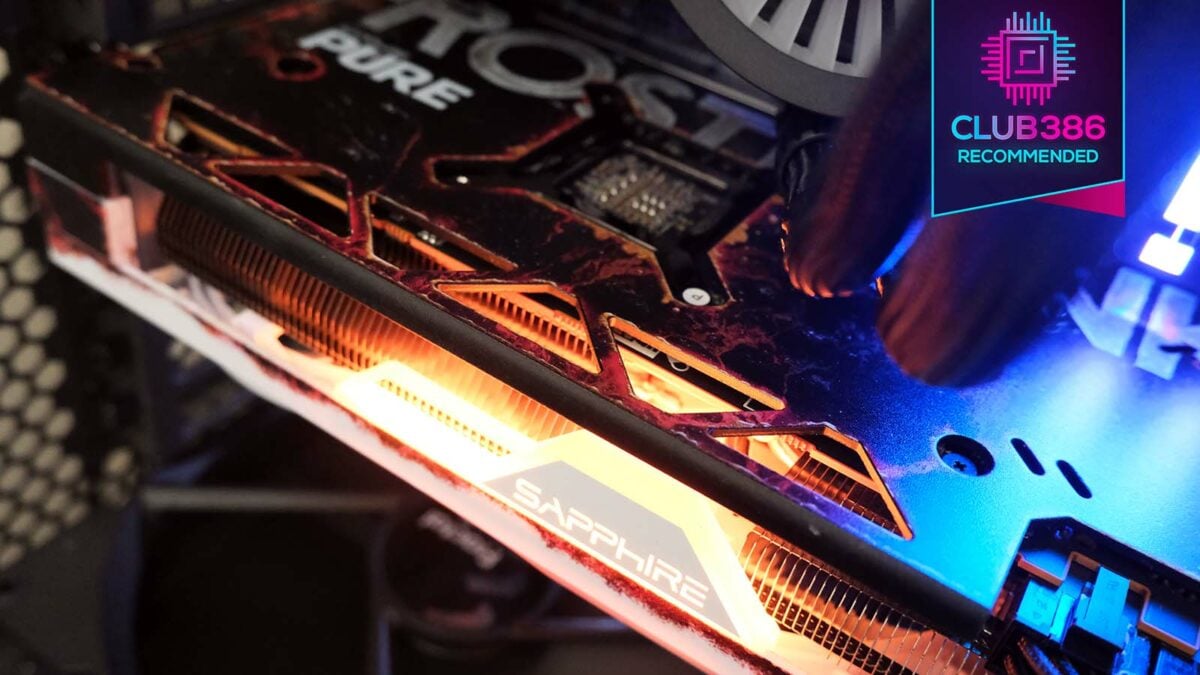
Sapphire Pure Radeon RX 7700 XT Frostpunk 2
£399 / $399
Pros
- Fantastic looks
- Great bundle
- Solid QHD performance
- Cool and very quiet
Cons
- RX 7800 XT close in price
Club386 may earn an affiliate commission when you purchase products through links on our site.
How we test and review products.
For those not au fait with where RX 7700 XT sits in the Radeon RX 7000 Series pecking order – heck, even I have to look up specifications from time to time – here’s an easy-to-digest table explaining high-level attributes.
| Radeon RX | 7900 XTX | 7900 XT | 7800 XT | 7700 XT | 7600 |
|---|---|---|---|---|---|
| Launch date | Dec 2022 | Dec 2022 | Sep 2023 | Sep 2023 | May 2023 |
| Codename | Navi 31 | Navi 31 | Navi 32 | Navi 32 | Navi 33 |
| Architecture | RDNA 3 | RDNA 3 | RDNA 3 | RDNA 3 | RDNA 3 |
| Process (nm) | 5/6 | 5/6 | 5/6 | 5/6 | 6 |
| Transistors (bn) | 57.7 | 57.7 | 28.1 | 28.1 | 13.3 |
| Die size (mm2) | 522 | 522 | 350 | 350 | 204 |
| Compute units | 96 of 96 | 84 of 96 | 60 of 60 | 54 of 60 | 32 of 32 |
| Stream processors | 6,144 | 5,376 | 3,840 | 3,456 | 2,048 |
| Game clock (MHz) | 2,300 | 2,000 | 2,124 | 2,171 | 2,250 |
| Boost clock (MHz) | 2,500 | 2,400 | 2,430 | 2,544 | 2,625 |
| Peak FP32 TFLOPS | 61.44 | 51.61 | 37.32 | 35.17 | 21.50 |
| RT cores | 96 | 84 | 60 | 54 | 32 |
| AI cores | 192 | 168 | 120 | 108 | 64 |
| ROPs | 192 | 192 | 96 | 96 | 64 |
| Infinity Cache (MB) | 96 | 80 | 64 | 48 | 32 |
| Memory size (GB) | 24 | 20 | 16 | 12 | 8 |
| Memory type | GDDR6 | GDDR6 | GDDR6 | GDDR6 | GDDR6 |
| Memory bus (bits) | 384 | 320 | 256 | 192 | 128 |
| Memory clock (Gbps) | 20 | 20 | 19.5 | 18 | 18 |
| Bandwidth (GB/s) | 960 | 800 | 624 | 432 | 288 |
| PCIe interface | 4.0 x16 | 4.0 x16 | 4.0 x16 | 4.0 x16 | 4.0 x8 |
| Power (watts) | 355 | 315 | 263 | 245 | 165 |
| Launch MSRP ($) | 999 | 899 | 499 | 449 | 269 |
This Navi 32 GPU loses out to its bigger RX 7800 XT brother by not being a full implementation of the die. There are further cuts to the Infinity Cache, memory capacity, footprint and bus width, and they culminate in RX 7700 XT offering around 85% of the performance. As I say, that’s still grand enough for QHD gaming.
Sapphire builds on the underlying AMD GPU through three distinct models: Pulse, Pure, and Nitro+. Each step up offers more Sapphire-specific features, but truth be told, performance doesn’t change that much, and that’s perfectly okay as a specific GPU only has so much frequency headroom available to it.
Adding value
The company is also acutely aware that today’s compressed RX 7700 XT pricing leaves little room for manoeuvre, so rather than inch up frequencies by 10MHz here or there by introducing yet another SKU, inventive minds have taken a different tack with what I believe to be the best RX 7700 XT bundle out there. Enter the Pure Frostpunk 2 Limited Edition.
Let me be clear. Sapphire isn’t reinventing the wheel. This card is effectively a three-fan Pure albeit with a custom heatsink design and enhanced bundle comprising the game, bespoke keycaps and pin badges. A graphics card bracket is carried over from the normal Pure.
At the time of writing, this £400 limited-edition bundle attracted only a £10 premium over the regular Pure, thus offering stonking value in my book, particularly when accounting for the £57 fee for the deluxe version of the game on Steam.
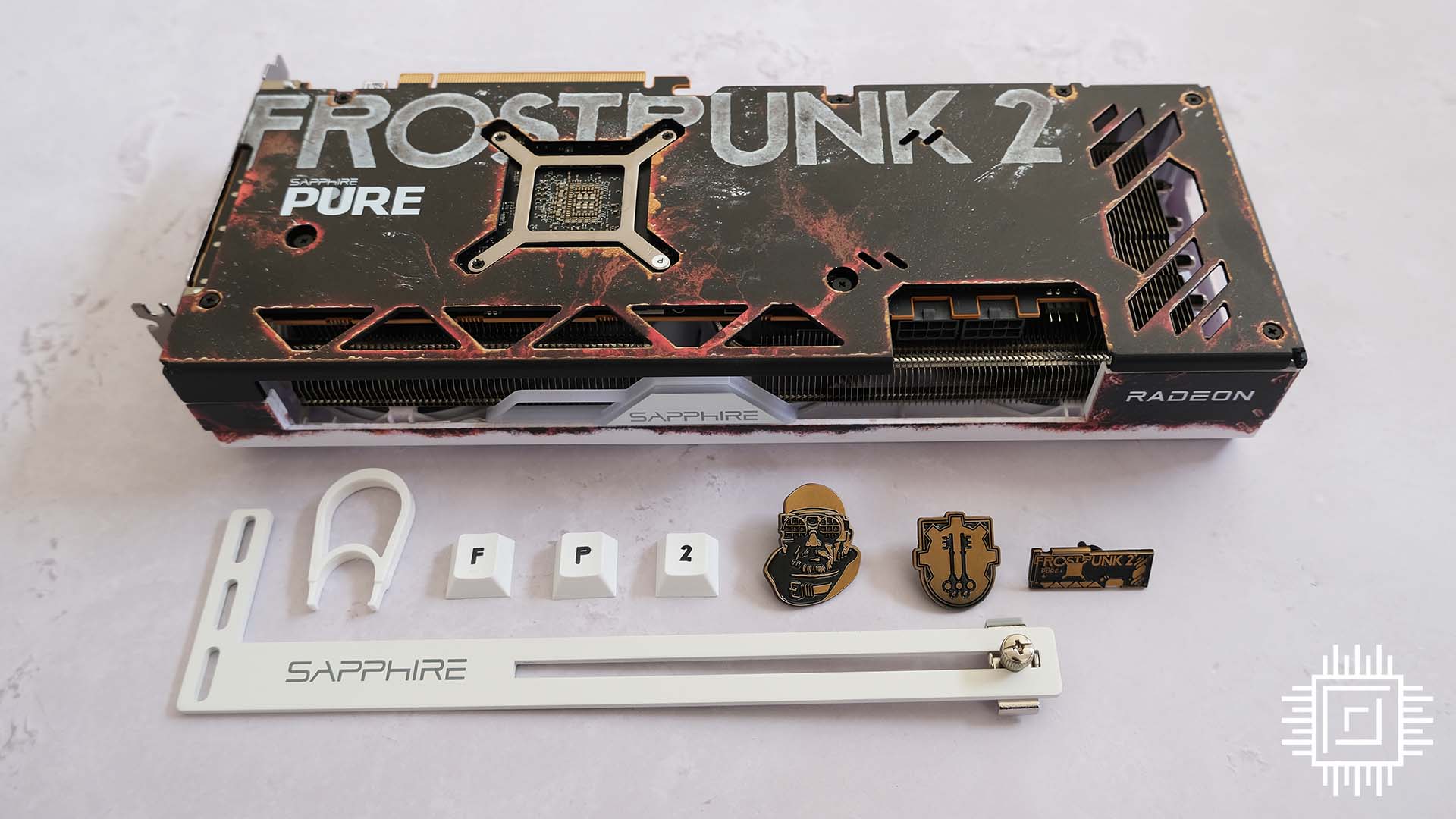
If you don’t know, Frostpunk 2 is the eagerly awaited successor to 11 bit studios’ well-received 2018 city-building survival game. The original scored an impressive 84 on review aggregator Metacritic.
Initially slated for global multi-platform release on July 25 this year, the studio delayed it until today, September 20, due to feedback from early-access users. After a spate of unfinished games coming to retail and subsequent chagrin from users, delaying is better than rushing.
You redeem the game by creating an account on AMDrewards.com and inputting a code contained within the bundle. This is in addition to the regular Q3 2024 AMD sweetener that includes Warhammer 40,000: Space Marine 2 and Unknown 9: Awakening, with both available until November 2, 2024.
Gorgeous card
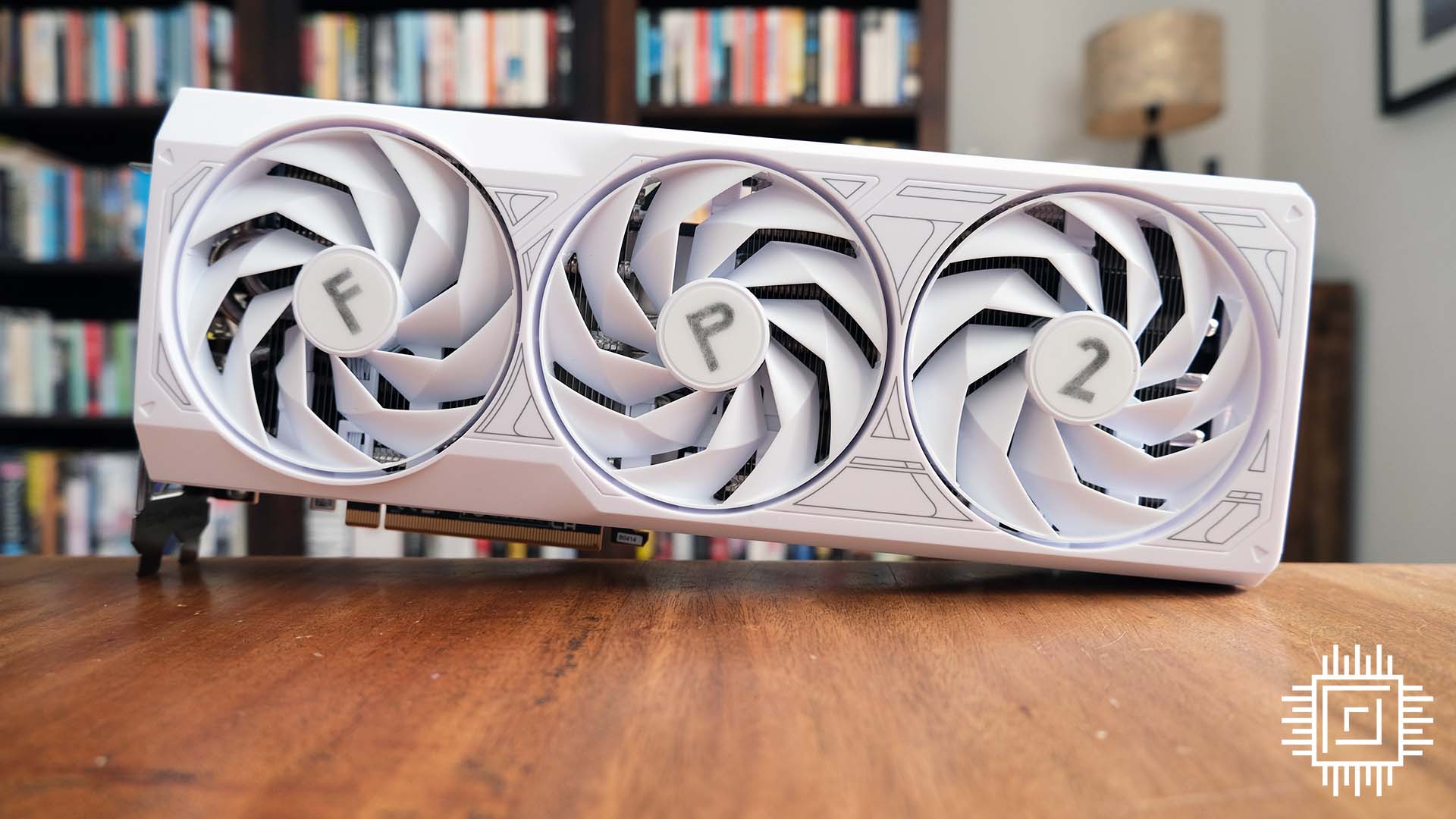
You’d be forgiven for thinking this is the regular Pure card on first glance. This card apes the original’s 2.5-slot form factor and 320 x 128.75 x 52.57mm dimensions. The white heatsink shroud also appears identical, though this is not the case, as I’ll show later on.
And if you really needing convincing that it’s a special-edition card, the somewhat deliberately faded FP2 symbols in the middle of the three fans are pretty cool. Nevertheless, I totally understand why Sapphire hasn’t paid too much attention to this side; you won’t see it in most chassis.
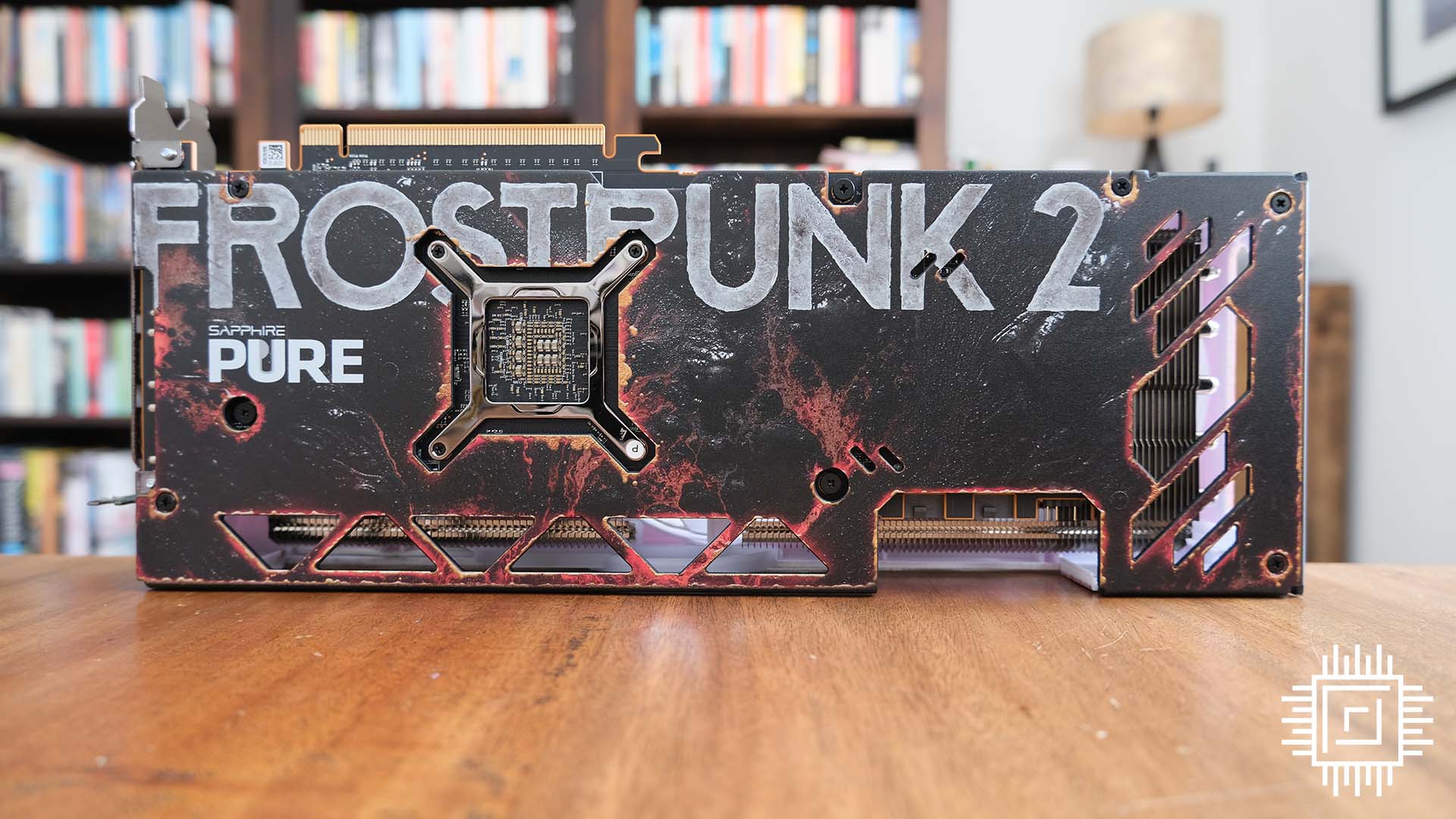
Here’s the obvious style departure. Sapphire’s done a fantastic job with the art on the rear metal heatsink. Mimicking the game’s mood, fans of the title won’t be left disappointed. The pseudo 3D effect works well, too. For me, it’s a minor shame the X-shaped GPU retention bracket is on view; a completely seamless rear plate would have been epic.
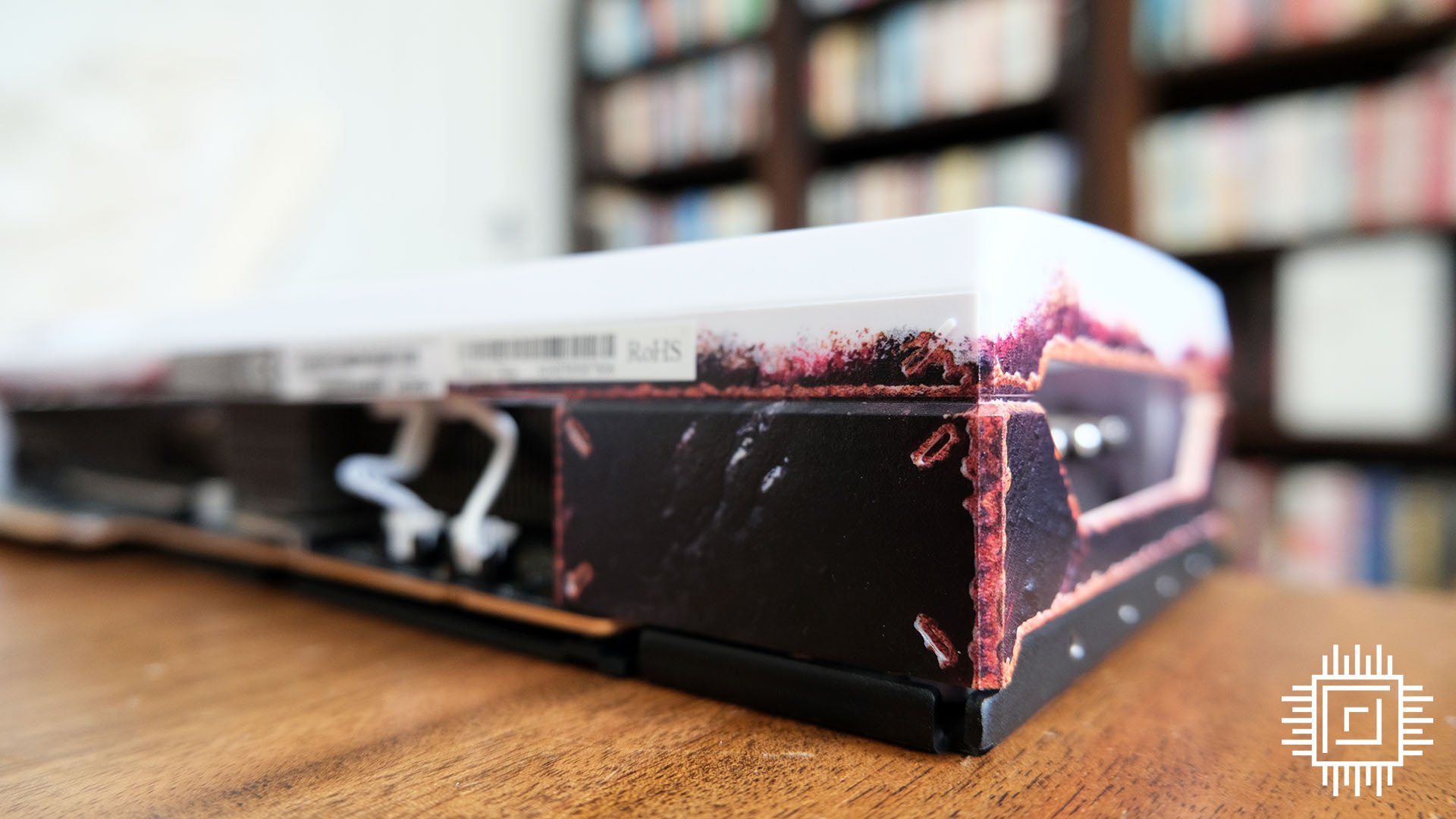
Remember I said the upper heatsink had more to it than first meets the eye. Sapphire’s Frostpunk 2-inspired art extends up to this section and is a nice touch.
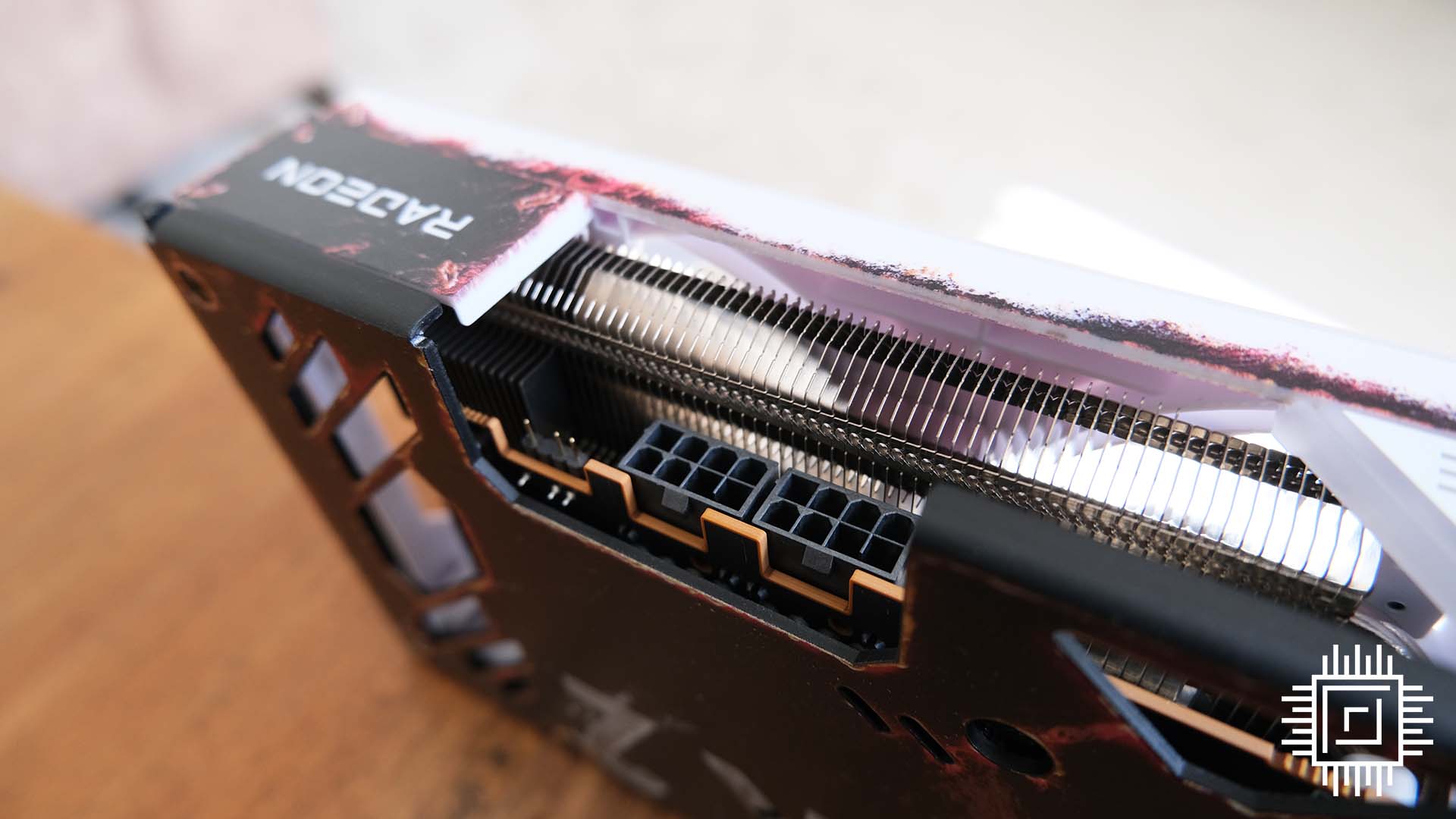
Like the base Pure RX 7700 XT card, power is sourced via two 8-pin power connectors. Running its 3,456 RDNA 3 stream processors at up to 2,584MHz – 40MHz faster than AMD’s specifications – gives rise to 240W total board power. Sapphire recommends a 700W power supply, and I agree that’s more than enough to drive a high-end system.
The trio of fans, meanwhile, switch off at low load and the transition between off and on is smooth. Equipped with a 12GB framebuffer humming along at a reference 18Gbps, you shouldn’t run out of video memory at the kind of settings the card is intended to be used with. I’m thinking QHD with every quality slider set to the right.
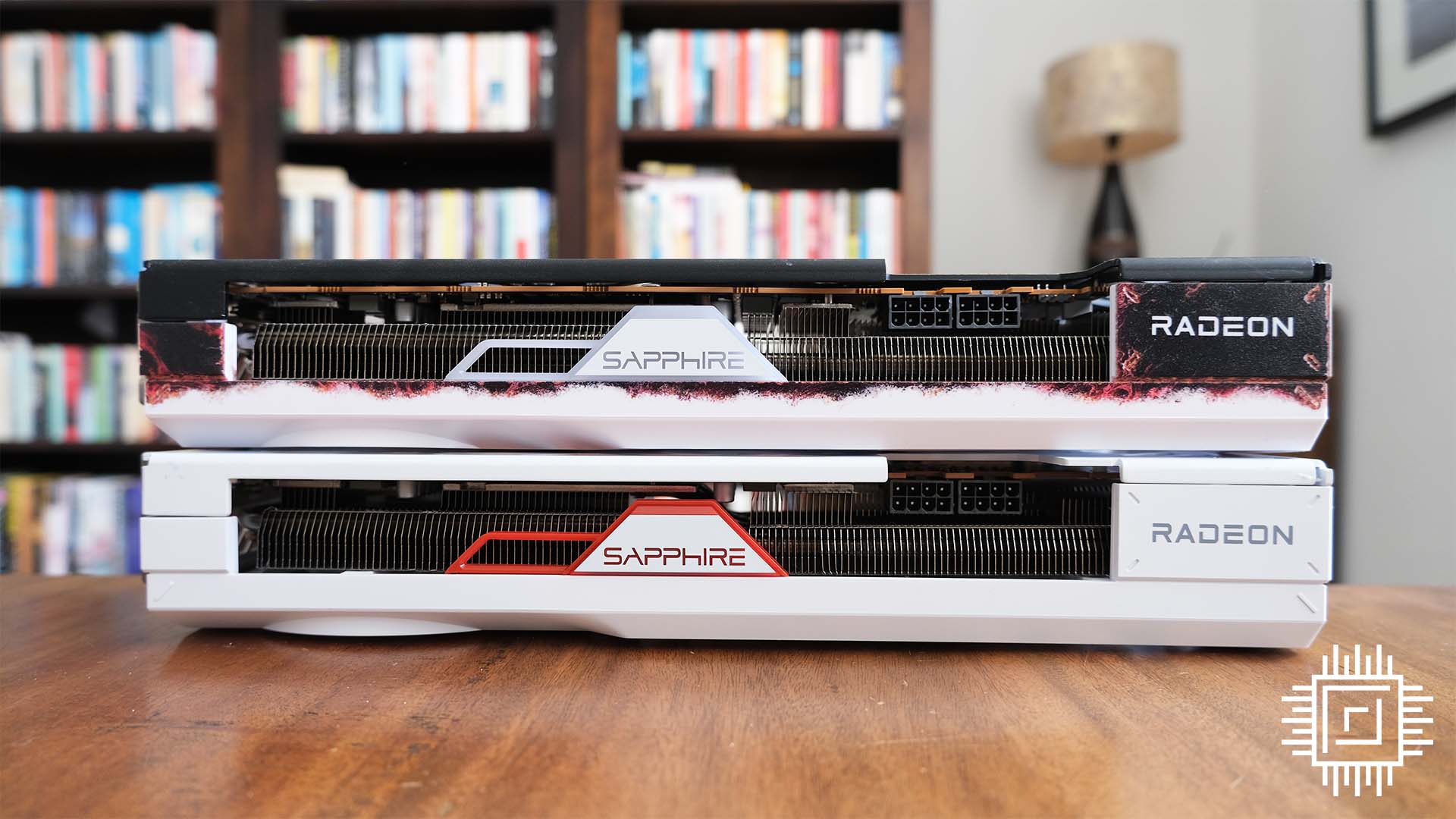
Because I also have the regular white Pure card to hand, I notice further differences. See the three pins to the right of the power connectors? These aren’t on the original, and their job is to synchronise the GPU fans’ cooling with your system. Regular Pure also has an LED switch on the rear metal heatsink; this one does not.
Which brings me on to another point. I’m absolutely not a fan of the standard Pure’s red Sapphire logo surround and matching LED. The colour is jarring against the white, so much so that I turn it off if the card’s in my machine.
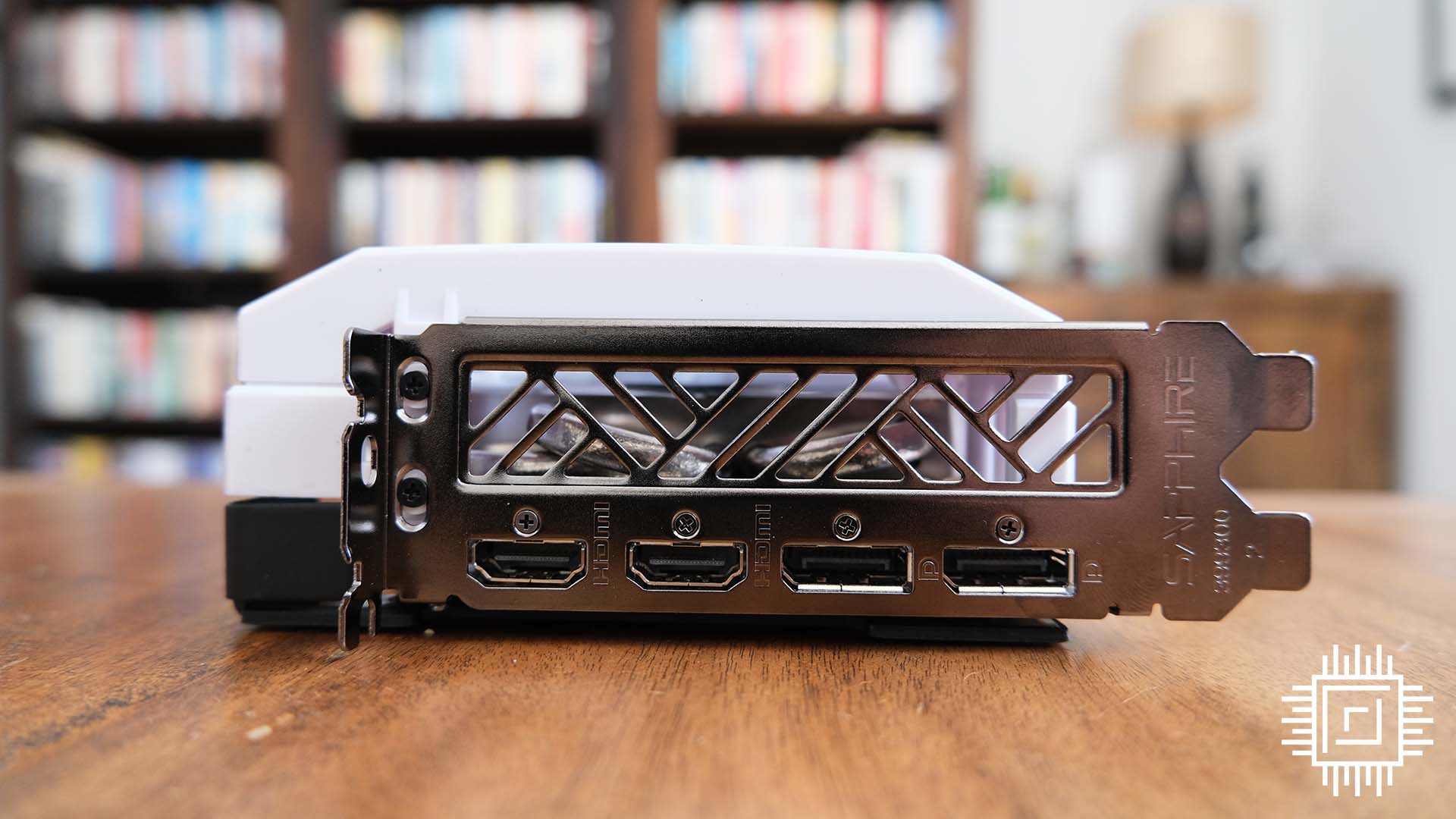
Frostpunk 2 Edition rights this style wrong by using a more tasteful logo and ARGB LED, set to a card-complimenting orange by default. Much better.
There’s little impetus to change rear outputs, comprising dual HDMI and dual DVI, meaning you can run four screens at once.
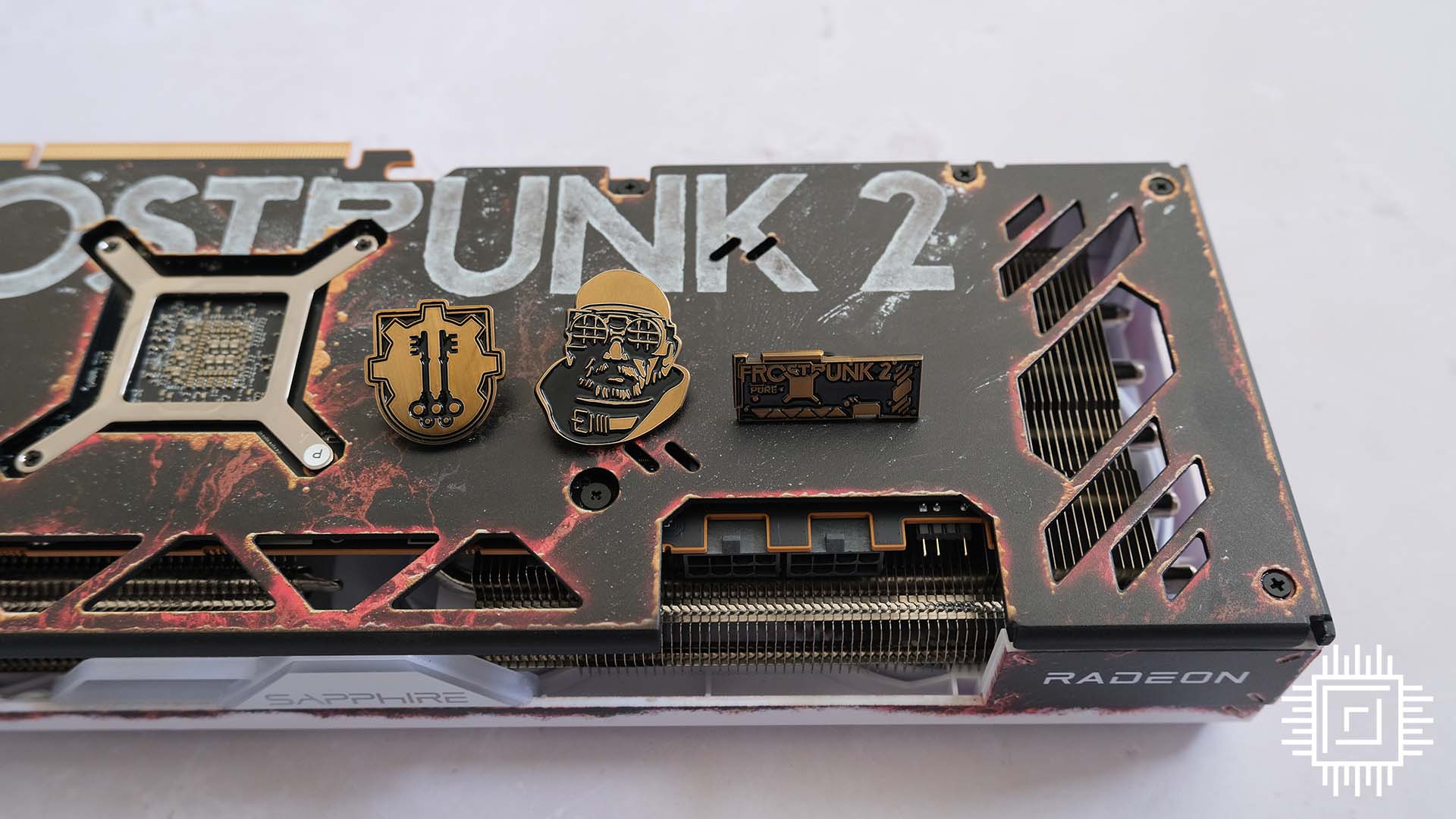
Got to say, I dig the three little enamel pin badges and FP2 keycaps. It’s only right that a special-edition card does a game the justice it deserves.
Performance
Run on the latest Club386 test platform housing an AMD Ryzen 9 7950X3D chip, I ran a couple of benchmarks as a sanity check. The card returns a score of 3,092 marks in 3DMark’s Speed Way test, which is exactly where I’d expect it to be. My experience suggests that’s enough for gaming at FHD120 or QHD90 with all possible eye candy turned on. There’s scope for more performance with framerate-boosting technologies such as FSR.
To that end and with a view of evaluating gaming performance for a plethora of titles that don’t exact the largest toll, I also benchmarked Final Fantasy XIV: Dawntrail at maximum settings with FSR active. The card scored 168/101, 105/66, 46/30fps average and minimum at FHD, QHD and UHD, respectively, reaffirming my thoughts that it’s a good solution for a broad selection of gamers out there.
Moving on to Assassin’s Creed Valhalla run at ultra-quality settings returns average and 1% minimum framerates of 135/86, 102/66, 56/40fps across the three resolutions, broadly mirroring what I saw in Final Fantasy XIV: Dawntrail.
Logs show the capable cooler tops out at 62°C with the fans spinning at an eerily quiet 1,020rpm. That’s impressive given the 238W maximum load observed when gaming.
Moving on to the title in question, Frostpunk 2, I snagged some gameplay prior to review thanks to the early access granted by the deluxe edition. Ensuring everything went smoothly, I used the Preview Driver version 24.20.11.01.
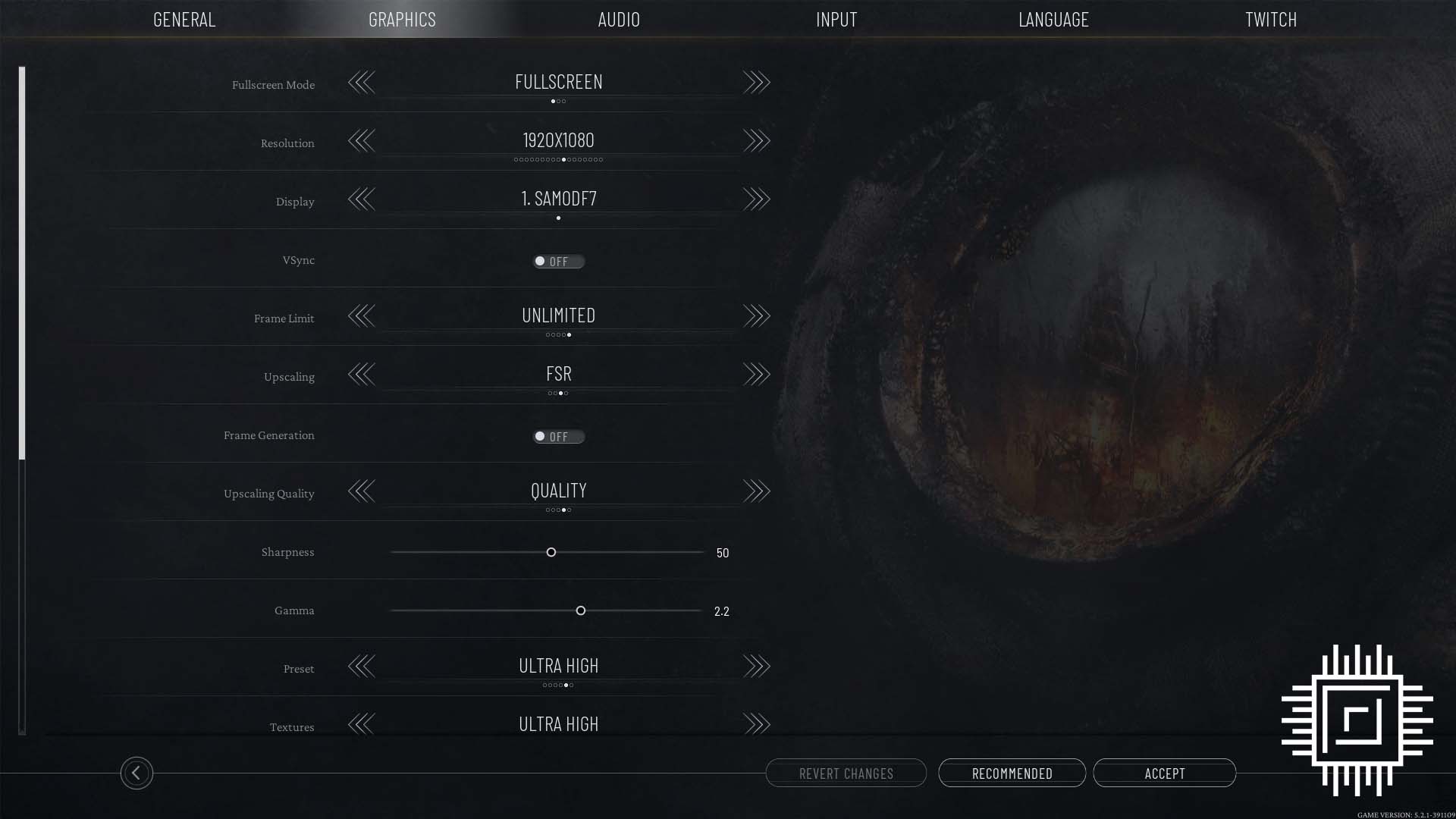
Jumping over to settings, I first used the ultra-high preset alongside framerate-boosting FSR set to quality mode. There’s an option for frame generation but I chose not to use it as I like to keep image fidelity sharp.
The city-building nature of the game is evident in the prologue. Up against a cold, bleak landscape, you’re tasked with building infrastructure and keeping your society safe. The first act is to break the frost covering important resources so that you can start a furnace fuelled by oil wagons.
A careful eye needs keeping on the men you send to do the job – many can die from starvation or the cold – and you must complete basic housing infrastructure before an apocalyptic whiteout occurs. Scary stuff that tests your moral compass in myriad ways.
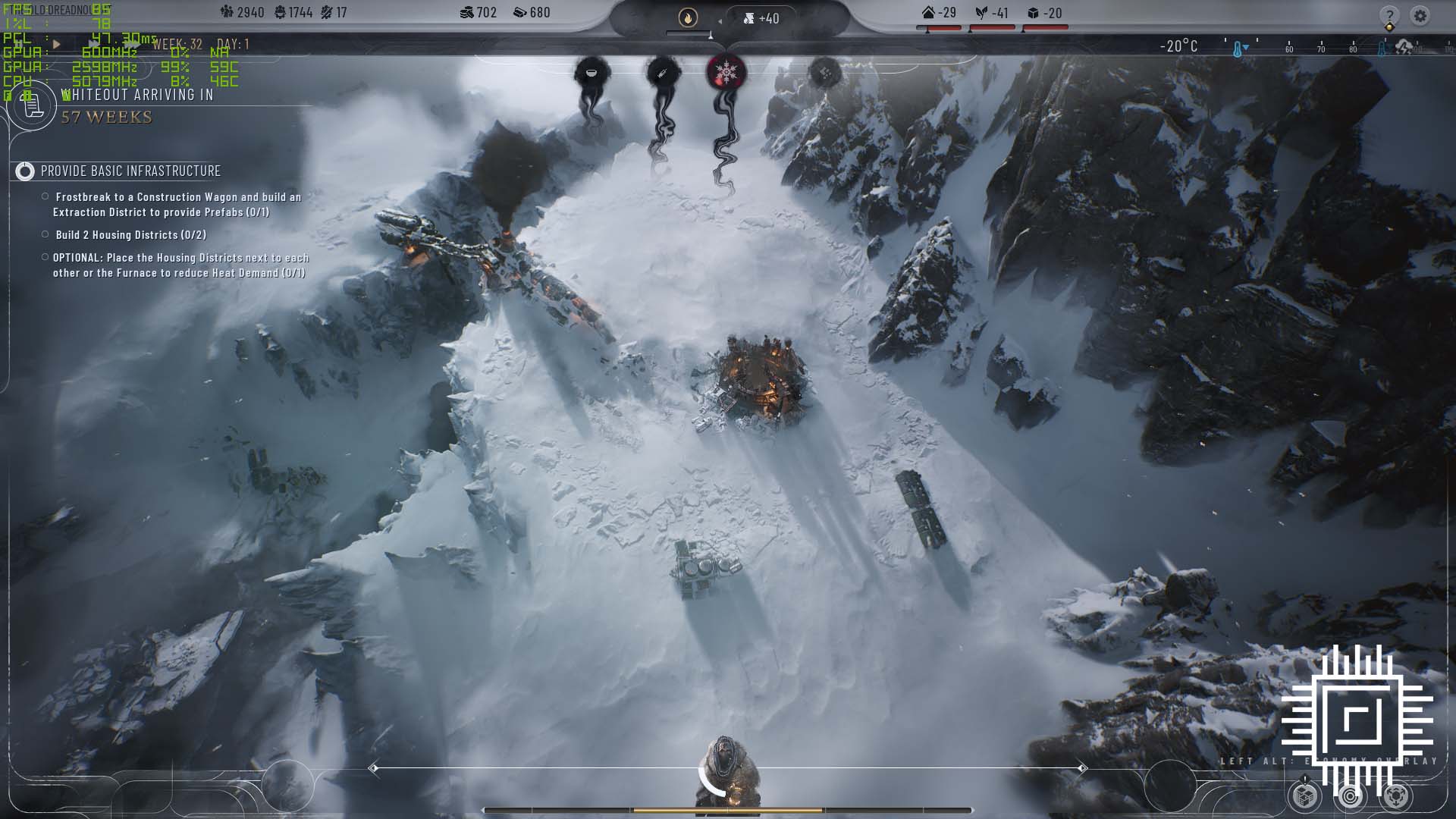
Here I’ve used the frost breakers to clear the area around an oil wagon which then needs connecting to a nearby furnace. Don’t worry, I won’t delve any further into spoiler territory, there’s a lot for fans of the series to explore on their own time.
Benchmarking graphics by zooming around the landscape for 30 seconds – the game’s nature is such that it doesn’t have large dips in framerate – here’s how Sapphire’s Pure Radeon RX 7700 XT 12GB performed across various resolutions and image-quality settings. I’ve noted average and minimum 1% fps. FSR is set to quality.
| Settings | Av / Min 1% @ 1080p | Av / Min 1% @ 1440p | Av / Min 1% @ 2160p |
|---|---|---|---|
| Ultra-high quality | 86 / 74 | 67 / 60 | 34 / 31 |
| High quality | 106 / 91 | 84 / 74 | 44 / 40 |
| Medium quality | 152 / 130 | 113 / 98 | 67 / 60 |
My advice distils simply. If you’re playing at 1080p (FHD) then opt for ultra-high-quality settings. Framerate is enough for you to put v-sync on, should you not have a FreeSync display to hand.
Gamers preferring 1440p (QHD) can get away with ultra-high because there’s not a whole lot of movement present in Frostpunk 2. Stepping up to 2160p (UHD), however, is much more taxing. I’d recommend dropping down to either high quality or medium quality.
For my part, I played at 2160p with high-quality settings and found the experience enjoyable. Know the card is powerful enough to drive whichever resolution you choose.
Conclusion
With Radeon RX 7000 Series graphics cards now firmly established, there’s little a manufacturer can do to improve performance over reference designs. Sapphire understands this issue all too well and decides flair and coolness are better eye-catching weapons than a minor bump in frequency. I wholeheartedly agree.
Running with Frostpunk 2 as a bundle theme, regular Pure RX 7700 XT is the recipient of an impressive style and bundle makeover. The custom heatsink looks great, Sapphire finally fixes the annoying red lighting, and the deluxe bundle of the game is augmented by enamel pin badges and keycaps.
If you’re not a fan of Frostpunk 2, that’s okay, because Sapphire has you covered with a multitude of other cards. If you are, I can’t think of a better bundle with which to explore the game.
Verdict: A beautiful card and bundle elevate Sapphire’s Pure RX 7700 XT proposition.
d.

